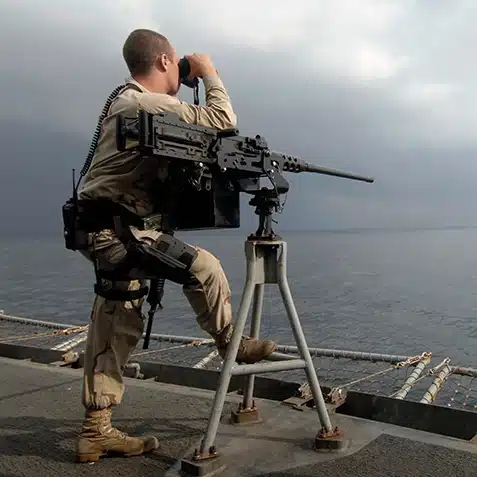Ship Security
Diploma in Ship Security
Ship Security
This internationally recognised Ship Security Officer Diploma from the Maritime Training Academy provides specialist training in maritime security, threat identification and operational procedures for vessel protection across global shipping routes and port facilities.
Study online and gain the knowledge required to assess vulnerabilities, implement security measures and fulfil the responsibilities of a certified Ship Security Officer (SSO). Our Onboard Security Course is ideal for officers, crew or maritime professionals pursuing compliance roles under the ISPS Code. Our Professional Ship Security Training qualifies you to identify security threats, conduct vessel inspections and apply protective procedures for ships operating internationally.

Professional Ship Security Officer Qualification
Learn how to manage shipboard security, assess risks and implement protective measures in line with international maritime regulations.
Contact us below to enrol today, or speak with our experienced course advisors.

Duration:
12 - 18 months
Learn at your own pace
Online Course:
Study from anywhere

Cost:
Diploma: £3,195
Certificate: £2,295

Recognised by: 
Ship Security Diploma vs Certification
Choose the right path for your career:
Comprehensive Training: In ISPS Code compliance, threat assessment, access control procedures, security drills and reporting protocols.
Flexible Study Duration: 12 – 18 month depending when you enrol to the program, study online at your own pace, from anywhere in the world.
Marine Industry Career Opportunities: 100% Online, with access to our student learning portal
Long-Term Career Impact: Ship Security Officer (SSO), Cruise Ship Security Specialist, Maritime Security Compliance Officer or Port Security Liaison.
Global Recognition: Our Diplomas are recognised by the University of Portsmouth and are supported by industry associations.
Assignments: One assignment is required to be completed and submitted at the end of each module, based on that particular subject.
Certification: you will receive a PDF Digital certificate (Printed Certificate Completion Pack available).
Final Examination: There will be a final examination upon completing and submitting all student assignments (exams are sat in April or October).
Post-Nominal letters: On passing the Diploma you can also use these letters after your name: MTA Dip MSec
Digital Course Badge: Upon successful completion students will receive an exclusive course badge for use on business cards, LinkedIn profiles and website(s)!
Diploma - £3,195
A globally recognised qualification for careers in maritime security, shipboard protection and vessel compliance roles under the ISPS Code.
✔
✔
✔
✔
✔
✔
✔
✔
✔
✔
Certificate - £2,295
Specialist Security Officer Training without formal assessments, for those who do not require a recognised diploma.
✔
✔
✔
✔
✔
✔
✔
Ship Security Curriculum: 11 Modules
Training covers ISPS Code requirements, security planning, risk assessment, restricted area control, search protocols and coordination with port and flag state authorities.
1. Introduction to Ship Security
- The Development of Ship Security
- What is Maritime Security
- Defining Maritime Security
- Differentiating Security & Safety
- Maritime Insecurity
- Maritime Vulnerabilities
- Potential Maritime Security Threats
- Criminal Activities
- Potential Threats to Specific Vessel Types
- High Risk Areas
- A Risk Management Approach
- What is threat Mitigation?
- Layered Maritime Security Approach
- A Regulatory Response to Maritime Security
- Design, People and Technology
- Organisations with Maritime Security roles
2. The Historical and Current Situation
- Piracy
- Piracy 1600-the present day
3. ISPS Code
- What is the ISPS code?
- Who does the code apply to?
- The aim of the ISPS code
- Ship Security assessment & Ship Security plan
- How to set up an ISPS system
- Procedures for ISPS port entry
- Company Security Officer
- Ship Security Officer
- The on-scene Ship Security Survey
- Non-compliant facilities
4. The Law and Maritime Security
- Legal Concepts
- Introduction to the Legal system, criminal and International law
- Maritime Law
- Admiralty law and jurisdiction
- International Marine Law
- The flag state Government
- Governmental control of shipping
- International aspects of security at sea
- The Use of Force
5. Preventative Measures and Security Procedures
- Threat assessment, mitigation and planning
- Design of secure ships
- Layered Maritime security approach
- Risk Management
- Security system design
- Introducing Security measures
- Controlling access
- Minimum security actions
- Monitoring security
- Access control and monitoring options
- Security equipment
- Safety versus Security
- Response by shipboard personnel
- What can go wrong?
- Training and preparation
- Security equipment and systems limitations
- Inspection, testing and maintenance
- Additional and supplementary forms of security
- Armed protection and deterrent
- Ports and port security
- Search techniques
6. Preventative Security Measures on Commercial Vessels
- Introduction
- Applicability and High Risk Zones
- Crew training and drills
- Securing the vessel
- Securing the perimeter
- Anti Rocket screens and bridge protection
- Aggressive defence
- National Navies, specialist security teams, escort vessels and convoys
- The threat made real
7. Passenger Vessel Security
- Background
- Potential Threats
- High risk areas
- Processes and Procedures
- How do they get on board?
- Mitigating activities
- Case studies
8. Superyacht and Private Yacht Security
- Introduction
- Legislative mix
- Same rules, different challenges
- Layered Maritime security
- Manoeuvring plan and practice
- Key security equipment and tools
- Security equipment and system limitations
- Case studies
9. Crew Impacts
- Recruitment procedures
- Security team employment
- Vetting crew
- Crew training
- Reporting incidents
- Crew Repatronisation
- Confidentiality
- Press and Media
10. Maritime On-Shore Security
- Protection of Commercial crew ashore
- Protection of Superyacht crew ashore
- Looking after Owners of Superyachts and VIP’s
- Closed Circuit Television (CCTV)
- Security Communications (COMMS)
- Security Soft Drills
- Vehicle Drills
11. The Actual Event
- History
- Weapons
- Damage
- Method of attack
- Boarding a Vessel
- Statistics
- Market share of security providers
- Bridge procedures
Hear from our Students
Meet the Course Director
Ian Biles
Managing Director at Maritime Services International
Ian has led MSI to become one of the world’s leading surveying companies. Ian’s qualifications include: Master Mariner, RYA Yachtmaster Ocean, Naval Architect (BEng Ship Science) and Business Management (MA Business Management).
Over the years Ian has worked with several specialist marine security companies in some challenging environments experiencing firsthand what it is like to be on the receiving end of significant security threats.

Ship Security Officer Course FAQs
Find out more about the course with our FAQs below.
How do I become a Ship Security Officer?
Start by enrolling in a recognised training programme. This diploma prepares you to meet ISPS Code requirements and carry out shipboard security responsibilities.
What qualification will I receive from this maritime security course?
You’ll earn a Diploma in Ship Security from the Maritime Training Academy — recognised across the shipping and cruise sectors.
Does this course meet ISPS Code training requirements?
Yes. The training aligns with international standards for Ship Security Officers (SSOs) and covers all ISPS Code operational competencies.
How much does a Ship Security Officer earn?
Salaries range from £30,000 to £60,000 depending on vessel type, role and experience. Senior SSOs on cruise ships or large commercial vessels may earn more.
Is this course suitable for cruise ship security roles?
Absolutely. The training is ideal for those working on or moving into cruise ship operations, including those transitioning from naval or military service.
Can I take this course without previous ship security experience?
Yes. It’s suitable for crew members, junior officers and maritime professionals seeking security compliance and operational training.
See our FAQ page for more questions answered about MTA courses.
Supported by:


Why Choose The Maritime Training Academy?

Flexible
Online learning allows you to study in your own time, at your own pace from anywhere in the world. This saves on travel and classroom costs and allows you to fit your studies around your job and progress your career.

Supportive
While the nature of distance learning is independent study, we recognise the importance of support. Students can contact us at any time during their course for assistance and our team of industry experts are always on hand for advice.

Expertise
We have over 50 industry experts writing, developing and advising on our course material. We truly believe that allowing students to tap into their expertise and knowledge is of the utmost importance to fulfil your dream career.
If you would prefer to complete this as a classroom-based course, please contact us.
